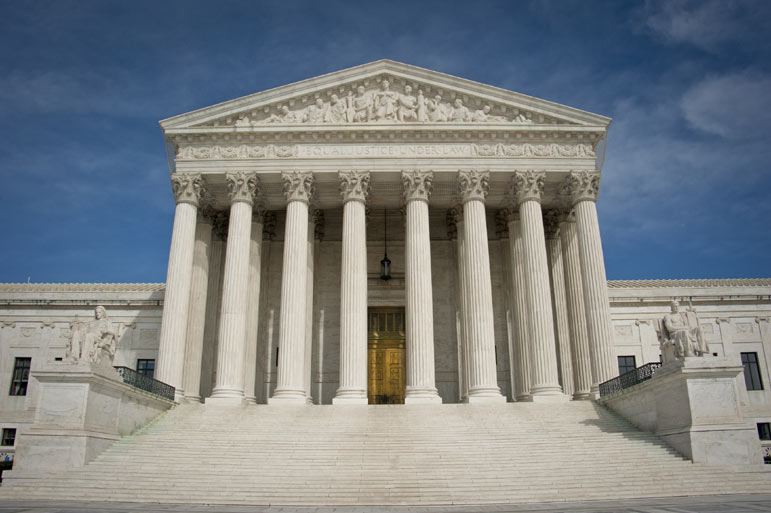
The court announced decisions in only three minor cases. That leaves two dozen, including important rulings on racial and partisan gerrymandering, whether the 2020 Census will contain a controversial question on citizenship and the fate of a 40-foot cross built as a World War I memorial that stands on public land in the Maryland suburbs outside Washington, D.C.
The court will announce those outcomes and others during a string of decision days that will commence next week. The court usually finishes its work before the end of June.
At the same time, the court is shaping its docket for the term that begins in October. It turned away two challenges that would have made for high-profile controversies.
The court declined to hear the case of a Yemeni citizen detained as an enemy combatant for more than 17 years at the naval base at Guantanamo Bay, Cuba, without being charged with a crime.
The court turned down the petition of Moath Hamza Ahmed al-Alwi without comment. But Justice Stephen Breyer said the court may soon need to take such a case to decide whether Congress' Authorization for Use of Military Force (AUMF) or the Constitution permits indefinite detention.
"Al-Alwi faces the real prospect that he will spend the rest of his life in detention based on his status as an enemy combatant a generation ago, even though today's conflict may differ substantially from the one Congress anticipated when it passed the AUMF," Breyer wrote.
The federal authorization was passed after the attacks of Sept. 11, 2001. Al-Alwi, born and raised in Saudi Arabia, was picked up in northern Afghanistan.
The government says he "received combat training at a Taliban-affiliated camp; stayed at Taliban- and Al Qaida-affiliated safehouses; was issued a rifle, ammunition, and grenades; and served in a Taliban combat unit in Afghanistan commanded by a high-level Al Qaida leader until well after September 11, 2001."
But al-Alwi's lawyers said lower courts found "no evidence that Mr. al-Alwi ever used arms against the United States or its coalition partners, or that he had anything to do with 9/11 or other attacks on the United States."
Al-Alwi is among 40 detainees at Guantanamo.
Al-Alwi contended his case was entitled to review because the reason for U.S. involvement in Afghanistan has changed. The government argued that in recent years, "two presidents have repeatedly reported to Congress that active hostilities 'remain ongoing' against Al Qaida, the Taliban, and their associated forces."
The justices also rejected a challenge to a federal law that requires the registration of gun silencers. The use of the device in the recent Virginia Beach, Virginia, shooting that left 12 dead drew new attention to the issue.
The court gave no reason for turning away petitions from two Kansas men who were convicted of violating the regulations. The men, joined by Kansas and seven other states, argued that the regulation violated their constitutional right to keep and bear arms.
The Trump administration told the court it should not accept the appeals, and the president has floated the idea of banning silencers.
The court accepted five cases that will be heard in the term beginning in October.
In one, a dispute between television cable provider Comcast and a black-owned entertainment company, the justices will consider making it harder to bring certain types of civil rights suits.
Comcast is fighting a lawsuit brought by Entertainment Studios Networks Inc., which is owned by comedian and producer Byron Allen. The company contends that racial discrimination is the reason it cannot get its channels on Comcast's cable systems. Comcast said the decision to reject the channels was strictly a business decision, based on what it thought viewers would want.
Allen sued under a Reconstruction-era law that says all persons have the right to "make and enforce contracts" and enjoy the "equal benefit of all laws and proceedings for the security of persons and property as is enjoyed by white citizens."
Comcast contended in the lower court that Allen would have to show that the cable company would have accepted the channels if not for Allen's race. But a unanimous panel of the U.S. Court of Appeals for the 9th Circuit said that at this early stage of the lawsuit, the entertainment company had to show only that race was one "motivating factor" in Comcast's decision.
The case is Comcast v. National Association of African American-Owned Media.
Sign up for the daily JWR update. It's free. Just click here.
(COMMENT, BELOW)


 Contact The Editor
Contact The Editor
 Articles By This Author
Articles By This Author